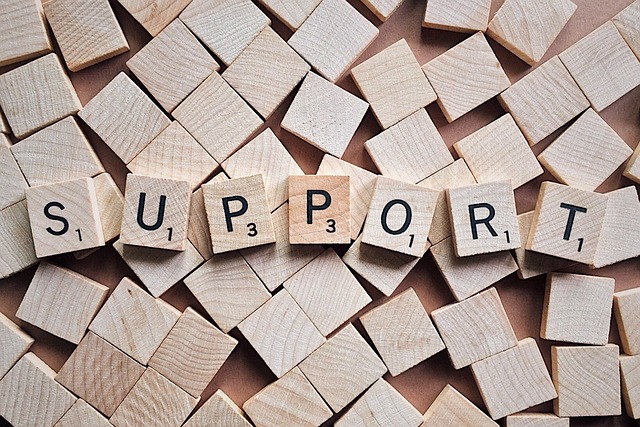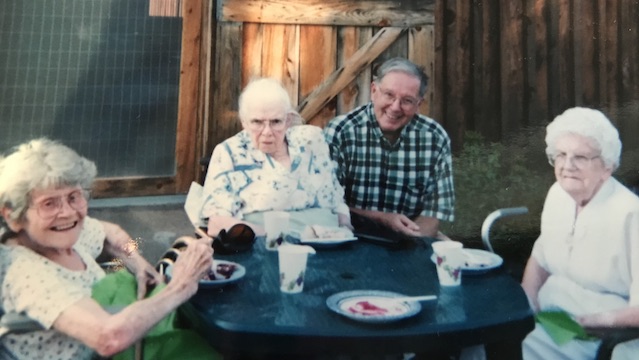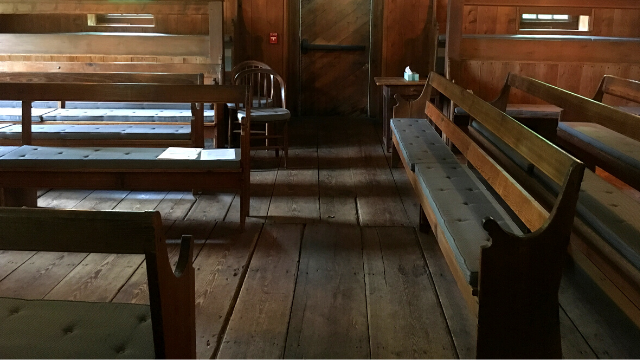The Friends Counseling Service (FCS) is a program of Philadelphia Yearly Meeting (PYM) that offers members and regular attenders professional counseling by licensed Quaker mental health professionals at a discounted rate. In times of stress and uncertainty, counseling can be a source of strength and support. [Read more…] about Friends Counseling Service: A Source of Support in Difficult Times
Pastoral Care
New Case Management Services for PYM Friends
A new resource is available for Friends in our yearly meeting!
Thanks to a generous need-based grant, members and regular attenders of PYM may be eligible to receive up to 10 hours of professional case management services through Living Care Home Services (LCHS). Eligibility is determined by individual need. LCHS, though based in Pennsylvania, serves the entire PYM region.
Case management can connect Friends with long term care, health care referrals, mental health resources, debt management and debt consolidation counseling, support with housing, help applying for social services, and help securing in-home care.
[Read more…] about New Case Management Services for PYM Friends
Creating Community: PYM to Offer Disability and Caregiver Support Groups
Throughout our yearly meeting, individual Friends and Monthly and Quarterly Meetings are diligently working to make our communities more accessible for any and all who are impacted by disability. We are overjoyed to share that the Philadelphia Yearly Meeting will be offering two different support groups: a Disability Support Group for Friends with disabilities and a Caregiver Support Group for Friends who are caregivers of those with disabilities. These support groups are open to members and attenders of PYM who self-identify as having and/or supporting individuals with any kind of disability, physical or mental, visible or invisible.
[Read more…] about Creating Community: PYM to Offer Disability and Caregiver Support Groups
Building Connections Through Grief, Loss, and Pastoral Care
On October 19th, Friends gathered at Chestnut Hill Friends Meeting for a Thread Gathering focused on grief, loss, and pastoral care. The day provided space for conversations about how meetings offer support during life’s difficult moments. Participants shared their experiences, noting that strong relationships help meetings respond when members are going through challenges.
[Read more…] about Building Connections Through Grief, Loss, and Pastoral Care
Exploring Thoughtful Planning with Compassion and Care
Discussing the stages of life is never easy, but it still remains one of the most essential acts we can offer both ourselves, our loved ones, and members of our meeting. The upcoming workshop, Creating Your Advance Directives and End of Life Plan, which will be one of the three at the Grief, Loss & Bereavement: A Pastoral Care Thread Gathering On October 19th, will provide a welcoming space for Friends to navigate this delicate subject. Participants will gain insight into critical documents, such as living wills and healthcare directives, that help ensure their values and wishes are honored. The facilitators, Susan W. Hoskins (Newtown Friends Meeting) and Susan K. Garrison (Media Friends Meeting), will lead a discussion on completing important materials, offering peace of mind to us and those we care for.
[Read more…] about Exploring Thoughtful Planning with Compassion and Care
Friends Counseling Service: Key Questions Answered for Accessible Mental Health Care
The Friends Counseling Service (FCS) serves members and attenders of Philadelphia Yearly Meeting (PYM) who are in search for guidance, comfort, and assistance. This service offers accessible mental health care to Friends across PYM with counselors providing individual therapy, couples counseling, and family therapy sessions. We connected with Janaki Spickard Keeler, Friends Counseling Service Coordinator, who provided additional insight into the service by answering some key questions.
Supporting Children and Teens After Violence in the News
How do we talk to children and adolescents about gun violence and senseless tragedy? Parents and caregivers are helping their children process their feelings alongside their own, and signs of anxiety are different in children and adolescents when compared with adults. Pastoral care for children begins with pastoral care for their caregivers, and the resources below are offered to support parents and caregivers, educators, and Friends who care for and work with youth. A concern about election violence led to the creation of this event in October for families — Peace Begins with You: A Gathering for Children & Families — and we hope you will share this community gathering and the resources below with your meeting.
Processing in Developmentally Appropriate Ways
Children and teens will have different exposure to and understanding of violent incidents, and may feel anxiety, confusion, fear, sadness, or anger, and have questions about what they see and hear in the media and from friends. Children cannot always articulate their feelings, and they may show us how they are feeling through play or behaviors. Their anxiety may show up as: anger, negativity, difficulty sleeping (particularly falling asleep), defiance, and lack of focus. For adolescent youth, symptoms of anxiety may include recurring fears and worries about routine parts of everyday life, irritability, trouble concentrating, withdrawal, and complaints about stomachaches or headaches.
* Some practical advice for parents and caregivers
- Parents and adults need to first deal with and assess their own responses to crisis and stress.
- In PYM, adults seeking support can reach out to the Friends Counseling Service.
- Try and keep routines as normal as possible. Children gain security from the predictability of routine, including attending school.
- Be present. Listen to your children’s fears and concerns.
- Depending on their age, limit exposure to television and the news but be honest with kids and share with them as much information as they are developmentally able to handle with simple, honest answers.
- Reassure kids that the world is a good place to be (individuals are responsible for violent actions).
- Reaffirm attachments and relationships.
Resources for Adults Supporting Children and Teens
- Spiritual Practices for Use During a Traumatic News Event from Traci Smith
- Talking to Children About Gun Violence from Everytown for Gun Safety
- Talking to young children about community violence from Sesame Workshop
- Talking to Children About Violence: Tips for Families and Educators from the National Association of School Psychologists
- Helping your children manage distress in the aftermath of a shooting from the American Psychological Association
- Isaiah and the Worry Pack — Learning to Trust God with All Our Fears by Ruth Goring
- A Kids Book About Anxiety by Ross Szabo from the “A Kids Book About” series. The inside covers suggests, ”This book is best read together, grownup and kid.”
Making Faithful Practices Available
Children need us to hear their concerns, and we can provide reassurance even if we do not have answers. Lifting up our worry and anxiety in prayer is another way to acknowledge those feelings and place them in the care of our Quaker faith. These coloring pages “Prayers For When You Feel Anxious” includes both suggested prayers and three different sets of images for mindful coloring. This lesson plan about meeting for worship suggests that our worship as Friends is a container that is strong enough to hold big feelings —even hard ones—and the lesson could be adapted to help process recent events and heavy hearts, alongside encouragement to continue finding the Light in our world.
Election Violence Prevention: Youth Programs
- For shepherd people (gifted in leading or organizing groups): Create or visit a youth forum, small or large, of teens and young adults. Support them in learning about and actively practicing nonviolent strategies for the political changes that they want to see.
- For relationship people (folks who are good at conversations and making friends): Ask some young people for their thoughts about the upcoming election cycle. Engage in conversation. What do they believe is likely to happen? How does that feel? Do they have concerns? Do they have ideas for action?
- For word people (talented writers and/or speakers): See if you can find a high school or university class or club to which you can speak about the election cycle and ways to engage in political change nonviolently.
- For prayer people (spiritual grounded intercessors): Pray for young people in particular throughout the election cycle. When the opportunity arises, invite young people you know to pray actively for nonviolence.
- For motion people (naturally physically active doers): Consider holding a sports tournament on a Saturday or several weekends in a row. During breaks and over snacks, talk about the election cycle and the influence young people can have on nonviolence in their communities.
- For learning people (research ninjas and data analyzers): Find out what, if anything, your local schools are teaching in terms of voter and civic education.
- For creative people (artists, musicians, performers, and crafters): Find an opportunity to hold a creative workshop of some sort for young people, either by organizing a group or by being a guest artist for an existing group. Use election violence prevention as your theme.
Image: Pixabay.com
Millville Meeting: Service to the Aging and One Friend’s Story
A Meeting’s Deep Care:
I was delighted to interview Elaine Graham, a member of Millville Monthly Meeting’s earlier Senior Concerns Committee, which is currently part of the meeting’s Spiritual Care Committee. The names of the committees both fit well with Elaine’s background as a nurse at Geisinger Health System in Danville, PA, and a professional educator who taught comunication courses. With care and communication as her background and with the support of members of the Senior Concerns Committee members including Dean Girton, Melanie Anderson, and Sandra Smith (now worshipping with Mountain View Monthly Meeting, Denver), programs and meeting guidelines regarding aging friends were developed. [Read more…] about Millville Meeting: Service to the Aging and One Friend’s Story
Spiritual State of the Meeting Report Invitation
NOTE: The deadline to submit reports has been extended to April 29, 2024
Warm greetings from the Ministry and Care Committee of Quaker Life Council. We trust this communication finds you well, grounded in Spirit and in your community of faith. All meetings are invited to submit their Spiritual State of the Meeting Reports for 2023 no later than April 15, 2024. We look forward to learning about your meeting and having the opportunity to share that learning more widely. Reports will be carefully read by members of M&C to guide our work in the next year and inform the Spiritual State of the Meeting Report for Philadelphia Yearly Meeting. To learn more about how these reports are used and how they are typically composed, see these advices. If you have further questions, please contact us at ministryandcare@pym.org. [Read more…] about Spiritual State of the Meeting Report Invitation
Tuition Aid for Quaker Children in PYM Friends Schools
The Yearly Meeting’s Quaker Education Granting Group reminds meetings and families that local meeting members’ children who are applying to or attending Friends schools are eligible to apply for educational support for the 2024-25 school year. Funding for all grants comes from the National Friends Education Fund and Philadelphia Yearly Meeting endowment income from the Jonathan Rhoads Fund and other PYM education endowments. [Read more…] about Tuition Aid for Quaker Children in PYM Friends Schools









